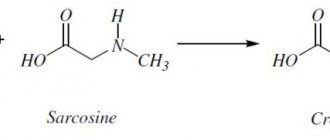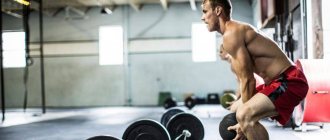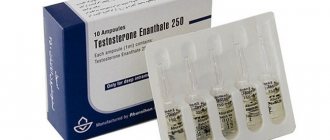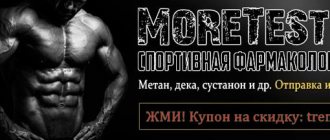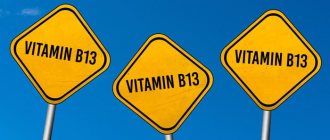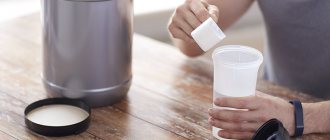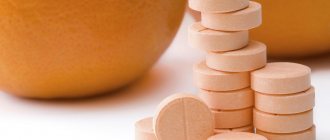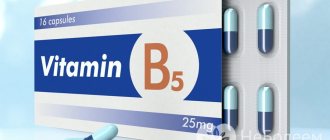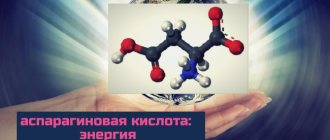Those who cannot imagine a day without sports and engage in it professionally should definitely take vitamins. Under conditions of intense physical activity, the body uses up nutrients several times faster, so symptoms of vitamin deficiency are not uncommon for athletes. All vitamins are important, but especially group B. Thiamine, riboflavin, niacin, pyridoxine, and folic acid are used in bodybuilding to build muscle mass, as well as to maintain the body’s strength during intense exercise. Let's figure out how to properly take folic acid (B9) and why it is so useful for athletes.
Solgar, Folic Acid, 400 mcg, 250 Tablets
from 877 ₽
More details
Function of vitamin B9 in the body
- The point of application of folic acid is the nervous system and the brain in particular . In addition, this vitamin is part of the cerebrospinal fluid, being an important element for maintaining homeostasis in the spinal cord. Folic acid plays no less important role in iron metabolism. It supplies carbon for the formation of iron-containing proteins in hemoglobin, affects the synthesis of red blood cells and thereby regulates the supply of oxygen to every cell of our body.
- The synthesis of DNA and RNA is also not complete without the participation of folic acid. Without it, genetic information is not encoded, and therefore old cells that have fulfilled their purpose are not replaced with new ones. In addition, it is vitamin B9 that is responsible for the feeling of appetite at the sight of tasty food.
- Folic acid also affects our mood. By organizing methionine metabolism, it promotes the production of so-called happiness hormones. At the same time, the synthesis of serotonin and norepinephrine occurs. Serotonin has a calming effect on the nervous system, providing the brain with the opportunity to rest. Norepinephrine gives you a boost of energy for the whole day. Both of these substances help cope with stress, and without the participation of folic acid, their production in the body would be impossible.
There are two forms of vitamin B9 – synthetic and natural. Interestingly, the human body absorbs the synthetic version best. This feature allows the active use of folic acid preparations in medicine and bodybuilding.
Sports needs
During sports, a person's need for folic acid is much greater than for those who do not play sports, since it takes part in protein synthesis.
How to take in bodybuilding
For a person involved in strength sports, it is very important to gain and maintain muscle mass. Folates promote active protein synthesis , which ensures muscle growth.
Intense training requires the athlete to have endurance and vigor throughout the entire workout.
In addition, the risk of decreased immune responses increases, as a result, the body has poor resistance to viruses.
Folic acid prevents all negative processes and helps:
- extend the training process;
- quickly restore strength after grueling workouts;
- cope with fatigue and loss of strength during the day;
- prevent injuries, sprains;
- reduce recovery time after training.
The daily requirement for bodybuilders doubles and amounts to 600 mcg . Sometimes doctors recommend taking 1000 mcg, it depends on muscle mass, intensity, and number of workouts.
Usually the daily dose is divided into two or three times, regardless of meals: in the morning before classes, two hours after training and in the evening. It is very important to drink a vitamin after exercise, since it is after 1.5-2 hours that the body begins to actively absorb vitamins and minerals.
Without vitamins, the processes of muscle catabolism begin, which must be prevented.
Benefits in other sports
People actively involved in sports such as running, dancing, gymnastics need B9 to prevent muscle loss and increase endurance.
In addition, sudden movements and heavy loads lead to injuries and micro-tears of muscle fibers. Folacin protects ligaments and muscles from negative processes.
The vitamin is involved in iron metabolism, increases the synthesis of red blood cells, thereby maintaining hemoglobin levels. The adaptive functions of the body increase.
Acid has a positive effect on a person's mood. By promoting the production of serotonin and norepinephrine, the vitamin gives a boost of energy and at the same time has a calming effect on the nervous system.
As a result, it is easier for the athlete to cope with stress and fatigue. The daily requirement of folic acid for athletes is 400-600 mcg. The need depends on the type of sport and intensity of exercise.
Therefore, folic acid is included in the list of mandatory vitamin supplements for athletes; it allows you to get the most from the training process.
Functions of folic acid in the body:
- synthesis of nucleic acids (DNA and RNA);
- regulation of the process of cell division;
- participation in the formation of protein and amino acids;
- red blood cell synthesis;
- muscle tissue regeneration;
- growth and development of all tissues in the body;
- stimulation of the immune system.
What threatens B9 deficiency?
Athletes burn folic acid much faster than those who lead a sedentary lifestyle. This means that deficiency symptoms can appear at any time.
Folate deficiency is said to be:
- constant feeling of fatigue;
- severe hair loss;
- bleeding gums;
- disruption of homeostasis (the body’s ability to maintain biochemical balance);
- exacerbation of gastrointestinal diseases;
- digestive problems;
- anemia;
- dizziness;
- inflammation of the mucous membranes;
- pale skin;
- muscle pain regardless of training;
- dyspnea;
- cardiopalmus.
Long-term deficiency is characterized by constant hunger, and the feeling of fullness during eating does not occur for a long time. This leads to overeating. And athletes who eat a lot to gain weight do not get the desired results. The muscles just don't grow.
If after training you are more tired than usual, physical exercise ceases to be enjoyable, sprains and injuries appear, this is a reason to get tested to determine the level of folic acid in the blood.
How to take folic acid for bodybuilding
The daily requirement for folic acid in men and women is 300 mcg. During pregnancy, it is recommended to consume up to 400 mcg of vitamin B9 in order to prevent congenital malformations in the fetus.
In the case of intense exercise in people leading an active lifestyle, the daily need for acid increases to 600 mcg. In some cases, it is possible to increase the dosage to 1200 mcg per day. The exact dose is calculated based on the athlete’s body weight and level of physical activity.
Application for weight loss
The use of folic acid for weight loss is determined by its ability to increase the speed of metabolic processes and break down fats.
It’s not for nothing that B9 is called the “ slimness vitamin .” It begins to activate in the liver, breaking down fats into fatty acids and alcohols, which are then excreted from the body naturally.
Some people's livers are unable to activate all the folic acid they get from foods, so they gain extra weight. In this case, it is necessary to take additional B9.
Folic acid alone will not cope with obesity; it is an addition to diet and exercise.
How to use
An adult needs 200 mcg of this vitamin per day. It is better to take it together with vitamin C and B12 , as they have a better effect on metabolism. The duration of the course is 60 days. Only a doctor can determine the exact dosage.
It is possible to achieve good results only when obesity is associated with a lack of this particular acid.
Important! Some people experience malfunctions at the gene level, then B9 is powerless in the fight against excess weight.
The role of folic acid in bodybuilding
Folic acid is necessary for athletes who receive heavy daily loads during training. This vitamin increases the body’s adaptive capabilities, which means it allows you to get the most out of regular activities. Folic acid will help muscles and all other organs cope with overload and allow them to quickly restore their strength after training.
Professional athletes have long included folic acid in the list of mandatory nutritional supplements. Vitamin B9, which activates protein synthesis, is an essential component for every bodybuilder. Taking this drug allows you to quickly build muscle mass, increase endurance and make your workouts truly effective.
Contents in products
In addition to taking folic acid supplements, you should eat foods rich in this vitamin. Animal products contain especially a lot of B9.
There is a high content of B9 in the liver: beef, chicken, cod, as well as in fish: tuna, salmon, trout.
The source of folacin is whole grain flour, legumes, fresh greens (spinach, parsley, cabbage). B9 is present in dairy products.
Important! Heat treatment destroys most of the vitamin.
Content in food:
| Product | B9 mcg/100g |
| Beef liver | 240 |
| Pork liver | 220 |
| Legumes | 160 |
| Cod liver | 110 |
| Parsley | 117 |
| Spinach | 80 |
| Whole grain flour | 50 |
| Corn | 46 |
| Bulgarian pepper | 53 |
| Cottage cheese | 46 |
| Egg yolk | 22 |
If a person does not engage in professional sports, then he can easily replenish folacin reserves by consuming foods rich in this vitamin.
Reception features
This vitamin is recommended to be taken without taking into account when the meal will be taken. For athletes, it is recommended to divide the required daily dosage into two applications. The most preferable would be the morning intake (before training) and the subsequent one (two hours after completion of physical activity).
If you plan to use an increased dose of the drug (1000 mg), it is necessary to take it three times a day. It is worth considering that taking Vit. B9 after training is a must, this need is determined by the increased need for certain vitamins and nutrients that are necessary for the successful completion of recovery processes and renewed strength.
Daily requirement
For athletes, it is necessary to take folic acid, since intense physical activity leads to vitamin deficiency without fully replenishing the need for vitamins. For a person with low and average levels of stress, the dosage is 300 mcg , for an athlete it is 600 mcg. According to the indications of a sports doctor, it can be increased to 1000 mcg per day.
How much to take to meet the daily requirement depends on the level of load and current body weight and muscle mass. It may be necessary to supplement your diet with foods rich in folic acid.
Why athletes need to take vitamins.
As practice shows, athletes-powerlifters, bodybuilders and other sports [especially strength] often resort to medications to achieve the desired results. Vitamin-mineral complexes are essentially considered the most harmless, in contrast to hundreds of worlds around protein powder or gainer.
1. In strength sports, sooner or later, on the way to the desired result [weight gain, fat loss], a so-called “training plateau” arises. That is, stagnation is when progress is made, and then bam... and it stops. And you can't understand anything. What are you doing wrong? There are many different reasons, but the most common mistake athletes make is avoiding beneficial pharmacology in the form of vitamins and minerals.
2. On the one hand, you can get everything you need from raw vegetables and fruits, but on the other hand, then you will have to eat kilograms of them, and not a lot of food fits into the human stomach? In addition, if you take a lot of varied foods, indigestion will not be far off?
3. Also, the second problem is that muscles will only grow when athletes load their bodies with high-calorie foods. If it is low in calories, the body may think that it is starving and will slow down the processes of metabolism and muscle growth. Either way, the food will not contain all the necessary components, and you have to resort to pharmacology.
4. All vegetables and fruits should be eaten raw whenever possible. The fact is that during heat treatment, 90% of folic acid is destroyed, and only 10% remains for our body.
Mode of application
You can take folic acid for bodybuilding regardless of meals and diet. The daily dosage should be divided into several doses. The morning dose is taken before training, the second – two hours after training. Men are usually prescribed a little more than women due to their muscle mass and hormonal levels.
If the dosage is increased to 1000 mcg per day, it must be divided into three doses. The last dose of folic acid is taken in the evening. Two hours after completing an active workout, the phase of absorption of microelements, vitamins and nutrients begins, therefore it is during this period that it is important to drink one of the parts of the daily dosage.
Application in sports
Vitamin B9 is used in professional sports for:
- Stable hematopoiesis. A normal number of red blood cells completely meets the oxygen needs of tissues, preventing hypoxia, as a result of which basic metabolic processes, including muscle growth, are accelerated.
- Improving brain activity, maintaining emotional health.
- Normalization of the function of the digestive tract.
- Fight fatigue. Taking complexes containing folic acid allows you to speed up tissue restoration processes after heavy physical exertion.
Professional athletes regularly monitor the level of vitamin B9 in the blood, since a lack of the substance can lead to decreased training productivity and worse results in competitions.
Bottom line
Folic acid is essential for humans. This vitamin takes part in the synthesis of amino acids, regulates nervous activity, is responsible for cell growth, and protects DNA from damage. With a lack of vitamin B9, anemia develops, which is fraught with the formation of an oncological process.
In the body, the intestines are responsible for the production of folic acid. But this vitamin is not always produced in the required quantities, so doctors prescribe medications with artificially synthesized B6. Folic acid is also found in some foods - fruits, nuts, seeds, leafy vegetables, beef liver and egg yolk. Vitamin C is necessary for the complete absorption of acid; this should not be forgotten.
What hormonal medications did you take to stimulate ovulation?
- Gonal 33%, 4030 votes
4030 votes 33%4030 votes - 33% of all votes
- Clostilbegit 25%, 3012 votes
3012 votes 25%
3012 votes - 25% of all votes
- Menopur 16%, 1959 votes
1959 votes 16%
1959 votes - 16% of all votes
- Puregon 14%, 1718 votes
1718 votes 14%
1718 votes - 14% of all votes
- Decayed 8%, 991 votes
991 votes 8%
991 votes - 8% of all votes
- Menogon 3%, 372 votes
372 votes 3%
372 votes - 3% of all votes
Total votes: 12082
Voted: 8888
January 17, 2018
×
You or from your IP have already voted.
What are the dangers of folic acid deficiency for bodybuilders?
With an insufficient level of B9 intake, anemia develops, the symptoms of which are lethargy, lack of strength, bad mood, irritability, and forgetfulness.
A lack of B9 can cause overeating and lack of sufficient muscle mass, since the body’s ability to synthesize new cells is important in this process.
Folic acid for muscle growth is involved in the formation of amino acids and protein, so its deficiency manifests itself in rapid loss of gained weight, low immune indicators, and poor resistance to viruses and infections.
Folic acid for bodybuilding is necessary for the purpose of quickly restoring strength after heavy loads; it helps cope with fatigue, muscle injuries, sprains, minimizing recovery time.
Consequences of excess and deficiency
As a result of many reasons, both hypo- and hypervitaminosis can occur in the body. Both pathologies are characterized by the development of a specific symptom complex and also pose a danger to the body as a whole.
Insufficient levels of folacin in the blood occur:
- Against the background of starvation or insufficiently varied diet. At the same time, the intake of the substance is limited by nutritional factors, irregular consumption of greens, vegetables and fruits.
- As a result of heat treatment of food. If most foods come in processed form, the level of vitamin B9 in the blood decreases. This situation is explained by the instability of the structure of folic acid when exposed to temperatures, that is, the vitamin is destroyed.
- Due to impaired absorption. The substance enters the small intestine. Some pathologies lead to a decrease in the efficiency of the intestines, as a result of which the penetration of folacin through enterocytes into the blood decreases. Hypovitaminosis occurs against the background of Crohn's disease and ulcerative colitis.
- Due to dysbiosis. Some part of the compound is still produced by the intestinal microflora. After prolonged antibiotic therapy or a previous illness, the balance of beneficial microorganisms may be disrupted, and, consequently, the production of the substance will decrease.
Vitamin B9 deficiency manifests itself as a disorder of hematopoiesis in the form of megaloblastic anemia. When the disease occurs, giant blood cells called megaloblasts appear in the blood against the background of a general decrease in the number of normal red blood cells. The pathological condition is accompanied by rapid fatigue, bowel dysfunction, gastric achylia, the appearance of aversion to meat dishes, the development of Hünter's atrophic tongue - a number of symptoms that include unpleasant sensations in the area of the muscular organ, changes in taste sensations and the appearance of the mucous membrane like a “varnished tongue”. A consequence of the progression of the disease is funicular myelosis, which is characterized by gait disturbance, the occurrence of unpleasant nervous sensations on the surface of the skin, weakness and decreased sensitivity of the limbs.
A reduced concentration of folic acid also leads to the early appearance of gray hair, mental disorders, and miscarriages.
In the 21st century, hypovitaminosis is extremely rare. This is due to a widespread improvement in the quality of life. The indication for taking vitamin B9 is the prevention of disorders of fetal formation during pregnancy, as well as identified deficiency of the compound.
Hypervitaminosis develops when there is an overdose of vitamins. In this case, damage occurs to the kidneys, nervous system, and gastrointestinal tract. In addition, high concentrations of folacin have been shown in clinical studies to reduce the activity of NK cells, the natural killer cells of the immune system. These components of the body's defense exhibit an antitumor effect, so hypervitaminosis increases the risk of developing cancer.
Contraindications to the use of folacin are therapy with cytostatics or anticonvulsants, as well as individual intolerance to the components of the drug.
Vitamin complexes and dietary supplements
Not everyone can afford to buy fresh greens in winter, so doctors prescribe artificially synthesized folic acid. This vitamin is well absorbed by the body and does not cause allergic reactions. The pharmaceutical industry produces a large number of preparations of pure vitamin B9, vitamin complexes containing it, and dietary supplements.
At the pharmacy you can buy a tablet version of pure vitamin B9 without any additives.
However, it is not recommended to purchase medications containing folic acid on your own. Only a doctor can determine what dose of vitamin a patient needs. For preventive purposes, taking higher doses is strictly prohibited, since an excess of B9 negatively affects the well-being of patients. We should not forget about this. It is especially dangerous for a healthy person to take medications for pregnant women with a high acid content - for prevention. You can “plant” the kidneys, liver, and circulatory system.
The dosage of B9 depends on the age, health status of the patient, and lifestyle. She is always different.
Complexes containing B9 are distinguished by one feature: they help better absorption of this vitamin. The complexes also contain other useful microelements/vitamins necessary for health. For example, vitamin C promotes the complete absorption of folic acid.
Dietary supplements are the same vitamin complexes, only with a modified composition of ingredients. They are used to replenish the body with minerals and microelements. Dietary supplements with folic acid are often supplemented with brewer's yeast, which increases the effectiveness of the drugs.
The release form of dietary supplements differs from conventional vitamin complexes:
- effervescent water-soluble tablets;
- powders for making smoothies;
- chewing candies/marshmallows.
The form of release of dietary supplements does not affect the quality of the vitamin. Many patients find it much more pleasant to use dietary supplements than tablets: they do not cause irritation of the mucous membranes and unpleasant emotions.
Review of preparations with folic acid
Folibert
The drug contains vitamins B12 and B9. The complex replenishes the body with important components and protects blood vessels from cholesterol deposits. That is, it is a preventative against atherosclerosis and cardiovascular diseases. It is used by pregnant women to prevent intrauterine pathologies of the fetus.
Doppelhertz active Folic acid
Contains B vitamins - 9, 6, 12. It also contains vitamin C and E. The drug is prescribed for diseases of the cardiovascular system, gynecological diseases, and during pregnancy for the full development of the fetus. Women also take the drug during breastfeeding.
The drug Maltofer
Contains, in addition to folic acid, iron polymaltosate hydroxide. Maltofer is prescribed for iron deficiency anemia, during pregnancy and breastfeeding. The dosage is calculated by the gynecologist. If iron deficiency is moderate, it is enough to take one capsule per day.
Fenyuls Zinc
Contains folic acid, iron, zinc. The complex is prescribed to compensate for the deficiency of vitamin B6 and microelements in children, young people, and adults. For example, it is used in the treatment of juvenile acne.
B9 for men
Under the influence of folacin, many reactions in the metabolism of carbohydrates, fats and proteins occur, which is important for men involved in sports.
Vitamin B9 affects the functioning of the nervous system. A deficiency of the substance leads to increased fatigue, irritability, and depressive disorders. A man can show aggression due to a lack of vitamin.
By increasing the activity of natural killer cells, folacin prevents viral infections and the formation of atypical malignant cells.
With the onset of puberty in boys, folic acid is involved in the process of spermatogenesis, which is necessary for the normal functioning of the reproductive system.
Description of the vitamin
Folic acid, or B9, is a water-soluble vitamin that is primarily used in the circulatory system and immunity. Also called folacin or folin. Derivatives of folic acid are vitamin B9 and are called folates.
Its name comes from the Latin "folium", meaning "leaf", and is associated with the history of its discovery. The first person to notice the substance was Lucy Wills. In 1931, she claimed that yeast extract treated anemia in pregnant women. Since that period, the search for the main substance began. This led to the discovery of folic acid in 1938. But it was first obtained from spinach leaves in 1941, and in 1945 B9 was synthesized chemically.
Folic acid enters the human body only with food and is synthesized by intestinal microflora. After entering the tissue, it participates in metabolic pathways, namely: it transfers carbon groups between organic compounds to form new substances.
The biological role of the vitamin is:
- regulation of cell division, because participates in the synthesis of DNA and RNA;
- tissue formation in the embryo;
- responsible for the production of sperm.
Red bone marrow cells are among the most frequently and rapidly dividing. They then make up the main pool of blood cells. Therefore, with B9 deficiency, they do not mature, maintaining an increased size. A large number of large immature red blood cells - megaloblasts - appear in the bloodstream. And since they cannot carry oxygen, megaloblastic anemia develops.
Where is B9 found?
You can get the vitamin from the outside either through taking its synthetic form or through food.
Folic acid is found in:
- green vegetables;
- onion;
- nuts;
- egg yolks;
- dairy products;
- mushrooms;
- fruits and juices from them;
- green peas;
- legumes;
- liver;
- fish;
- meat.
In bodybuilding, Folic acid forte tablets are used to replenish B9. Low cost (about 70 rubles) is combined with high efficiency.
The GNC company presents a complex for men MegaMen. It includes the standard set of vitamins, as well as D, zinc and folic acid. They are characterized by high availability and a wide variety of vitamin complexes.
TabsVitasystemMultivitamins tablets also contain a whole set of vitamins. It contains about 1 mg of folic acid. The manufacturer recommends taking a break of 1 month between courses.
Dietary supplements
Additional intake of folic acid into the body can be ensured by taking specialized medications. If a person is unable to follow a diet enriched with foods high in vitamin B9, doctors recommend taking vitamin complexes. In addition, products containing folic acid are prescribed as prophylaxis or as part of a complex treatment of diseases of the gastrointestinal tract, bone marrow, and during pregnancy. As a rule, when taking the vitamin correctly, no adverse reactions are observed. An overdose is manifested by nausea, vomiting, abdominal pain, metallic taste in the mouth, urinary disorders, anxiety, insomnia and other symptoms.

